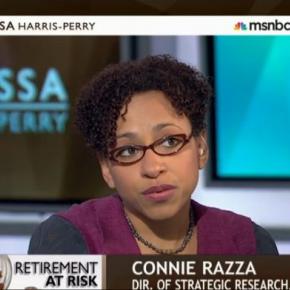Economic policy symposium held over US interest rate hike
Fed Rate Hike Threatens Jobs and Wages
12/16/2015
Statement & Booking Opportunity : Connie Razza, Director of Strategic Research for the Center for Popular Democracy (CPD) released...
12/16/2015
Statement & Booking Opportunity : Connie Razza, Director of Strategic Research for the Center for Popular Democracy (CPD) released the following statement in advance of the likely interest rate hike this afternoon:
“The presumption underlying the Fed’s decision today is that the economic recovery is nearing completion, a determination wholly at odds with the data on which the Fed is committed to depending. Inflation is well below the Fed’s own target and wages remain stagnant, yet Fed officials voted today to intentionally slow down the economy. Today’s announcement lays the foundation for unnecessary economic obstacles in the way of the tens of millions of working people across the country who deserve higher wages and better jobs, and particularly the Black and Latino communities still mired in a Great Recession. We urge the Federal Reserve to deliberate carefully in considering future increases.” The Fed Up campaign is bringing the voices of working families and communities of color into the national debate about Federal Reserve policy. In the past year, our members have met with 9 of the 12 regional presidents and 4 of the 5 sitting Governors, sharing with them the human realities that underlie the economic numbers. We are urging the Fed to fulfill both sides of its dual mandate and build an economy with genuine full employment, where everybody who wants a good job can find one. In the event that the Federal Reserve does not raise interest rates, you will receive another statement following the Fed’s announcement on Wednesday afternoon.
To schedule interviews with Connie Razza, send an email to ajain@populardemocracy.org
###
www.populardemocracy.org
The Center for Popular Democracy promotes equity, opportunity, and a dynamic democracy in partnership with innovative base-building organizations, organizing networks and alliances, and progressive unions across the country. CPD builds the strength and capacity of democratic organizations to envision and advance a pro-worker, pro-immigrant, racial justice agenda.
Media Contact:
Anita Jain, press@populardemocracy.org, 347-636-9761
Sofie Tholl, stholl@populardemocracy.org, 646-509-5558
Dear Senators Flake, Collins, and Murkowski
Senator Flake, you were confronted on national television by two activists, both claiming to be rape survivors. Maria Gallagher and Ana Maria Archila gained national fame over the video of that...
Senator Flake, you were confronted on national television by two activists, both claiming to be rape survivors. Maria Gallagher and Ana Maria Archila gained national fame over the video of that confrontation, and both say they’ve never spoken about their experiences before. The testimony of Christine Blasey Ford gave them the strength, they said, to come forward. But they haven’t, at least as far as I’ve seen so far.
Read the full article here.
Trump Picks Federal Reserve Governor Jerome Powell To Lead The Central Bank

Trump Picks Federal Reserve Governor Jerome Powell To Lead The Central Bank
“It’s relieving that Trump chose someone that represents continuity from the current Fed,” said Jordan Haedtler, manager of the Fed Up campaign, a coalition of groups that advocates for...
“It’s relieving that Trump chose someone that represents continuity from the current Fed,” said Jordan Haedtler, manager of the Fed Up campaign, a coalition of groups that advocates for progressive Fed policies. “But it’s also unclear why if he wants continuity with the Fed’s policies of accommodating monetary policy and reasonable financial protections, he would not have reappointed Janet Yellen, who is by many metrics the most successful chair in Fed history.
Read the full article here.
City-issued IDs give immigrants access as Trump tightens rules
New Haven, Conn., was the first city to issue a municipal ID in 2007 following the fatal stabbing of a 36-year-old undocumented immigrant while he cashed a check, according to a 2013 report by the...
New Haven, Conn., was the first city to issue a municipal ID in 2007 following the fatal stabbing of a 36-year-old undocumented immigrant while he cashed a check, according to a 2013 report by the Center for Popular Democracy on municipal ID programs.
Read the full story here.
Columbia Law Students Ready for Public Service Fellowships
“As the son of immigrants from Ecuador, Miranda said he developed an “intimate understanding of the injustices faced by marginalized communities.” He carried this understanding to Columbia Law...
“As the son of immigrants from Ecuador, Miranda said he developed an “intimate understanding of the injustices faced by marginalized communities.” He carried this understanding to Columbia Law School, holding internships at Bronx Legal Services (BXLS) and New York Lawyers for the Public Interest, in addition to an externship at the Center for Popular Democracy.”
Read the full article here.
Elizabeth Warren, Workers Take Aim at ‘Walmart Economy’
RH Reality Check - November 19, 2014, by Emily Crockett - When Sen. Elizabeth Warren (D-MA) and Rep. George Miller (D-CA) invited Walmart workers to brief Congress on Tuesday about the...
RH Reality Check - November 19, 2014, by Emily Crockett - When Sen. Elizabeth Warren (D-MA) and Rep. George Miller (D-CA) invited Walmart workers to brief Congress on Tuesday about the retail giant’s abusive practices, the conversation was about more than just Walmart.
“No one in this country should work full-time and still live in poverty,” Warren said.
“This is about the simple dignity of the people you have hired to work,” Miller said. “When you have a higher minimum wage, fair scheduling, and equal work for equal pay, the perception of the business goes up in the people’s mind, the customers go up and the revenues go up.”
Cantare Duvant, a Walmart customer service manager, said at the briefing that since Walmart is the nation’s largest retailer, it sets the standard for others in the industry. “So not only do we as Walmart workers deserve better, our economy also deserves better,” she said.
Duvant is a member of OUR Walmart (Organization United for Respect at Walmart), a union-backed group of Walmart workers who are, in Duvant’s words, “struggling to support our families on low pay and erratic scheduling” in what is now “Walmart’s low-wage economy.”
“Walmart specifically is worth discussing not only because of the 1.3 million workers it directly employs, but also because of the impact its employment practices have on the rest of our economy,” said Amy Traub, senior policy analyst at Demos. She said Walmart does this by “pushing down wages, limited workers hours, and squeezing its suppliers and its competitors.”
A majority of Americans are paid by the hour, and about half of early-career adults have no say in their work schedules, said Carrie Gleason, director of the Fair Workweek Initiative at the Center for Popular Democracy. “This isn’t just a narrow section of people,” she said.
Sen. Warren, a progressive hero who was recently appointed to a position in the Senate Democratic leadership, said that the issue of low-wage work in America is “deeply personal” for her.
When her father lost his job after having a heart attack, Warren said, her working-class family couldn’t pay the bills, lost their car, and almost lost their home. Then one day, “My mother, who was 50 years old and had never worked outside the home, pulled on her best dress, put on her lipstick, put on her high heels, and walked to Sears to get a minimum-wage job.”
“But here’s the key: It was a minimum-wage job in an America where a minimum-wage job would support a family of three.”
That could never happen today, Warren said, when “a momma and a baby on a full-time minimum-wage job cannot keep themselves out of poverty.”
Warren used the briefing to promote three pieces of legislation aimed at helping low-wage workers, including but not limited to people working at Walmart.
Those bills would raise the federal minimum wage to $10.10 per hour, give workers more reliable and flexible schedules, and help women address unequal pay based on gender.
Equal pay came up because women make up about two-thirds of the low-wage work force, and many are family breadwinners. Warren said that women in about half of American jobs can be fired just for asking whether their pay is unequal to their male coworkers.
The Schedules That Work Act, Warren said, is about the “basic fairness” of workers being able to plan for a second job, child care, or schooling. It would require employers to give workers their schedules two weeks in advance, compensate them for showing up for work only to be sent home, and not retaliate against workers for requesting more flexible or predictable schedules.
All three bills have been blocked by Republicans, which Warren openly acknowledged.
“I know that change is not easy. We might not pass these bills right away,” she said. “But don’t kid yourself about the importance of these bills, and the assurance that we’re eventually going to get them through.”
The Schedules That Work Act in particular would help Fatmata Jabbie, a Walmart worker and refugee from Saudi Arabia whose story was read at the hearing.
“Although I am not full-time yet, I am virtually on call seven days a week to pick up extra hours,” she said in her written statement. Her reward for that trouble is usually only 30 to 36 hours of work and $150 to $200 in take-home pay.
“I am a mom with two beautiful children, so I am not the only one who relies on that salary to survive,” Jabbie said.
OUR Walmart is pushing for bigger reforms than the three bills Warren promoted though. Members of the group are calling for their aggressively non-unionized employer to pay a minimum living wage of $15 an hour, provide stable, full-time schedules, and stop retaliating against workers who speak out against the company’s practices.
Duvant, for instance, already makes the $10.10 per hour that the federal minimum wage bill would guarantee—but that doesn’t do her much good, she said, when Walmart will only schedule her for 16 hours of work per week.
And Evelin Cruz, who worked for Walmart for 11 years, said at the hearing that the company fired her a few weeks ago for her activism with OUR Walmart.
“We spoke out for change, and Walmart did what it does best, which is bully, retaliate, and fire me,” she said.
Cruz told RH Reality Check that even though she no longer works at Walmart and is looking for other work, she’ll keep up the fight with OUR Walmart.
“That’s what they count on, for people to be out of Walmart and no longer want to participate,” she said. “But this is an issue that is not only affecting people in Walmart. It’s a widespread problem of scheduling, lack of hours, and a minimum wage that you can’t survive on.”
Source
Corporate power on the agenda at Jackson Hole
Protesters from the Fed Up group will once again be on hand this year as they campaign for central bankers to focus more on inequality and depressed wages.
Protesters from the Fed Up group will once again be on hand this year as they campaign for central bankers to focus more on inequality and depressed wages.
CPD Director of Research Connie Razza on Melissa Harris-Perry
How Pension Plans are at Risk
Melisa Harris-Perry - March 23, 2014 - Lynnette Khalfani-Cox, Connie Razza, Arun Gupta and Karen Friedman takes a closer look at Detroit’s pension funds as...
Melisa Harris-Perry - March 23, 2014 - Lynnette Khalfani-Cox, Connie Razza, Arun Gupta and Karen Friedman takes a closer look at Detroit’s pension funds as the city struggles with bankruptcy and the growing retirement savings crisis nationwide.
How CEO Pensions Compare to Average Workers' PensionsMelissa Harris-Perry - March 23, 2014 - According to a recent survey, CEO pensions are worth at least 239 times more than the average employee's 401(k) at ten of the biggest U.S. companies.
Why Cities are Watching Detroit
Melissa Harris-Perry - March 23, 2014 - The MHP table discusses if other American cities could be on the same road as Detroit.
One Word Could Be Worth a Million Jobs
Supporting a strong job market is a big part of the U.S. Federal Reserve's mandate. Fed officials, though, interpret that goal differently than most observers do. For the economy's sake, Congress...
Supporting a strong job market is a big part of the U.S. Federal Reserve's mandate. Fed officials, though, interpret that goal differently than most observers do. For the economy's sake, Congress should step in to resolve the discrepancy.
Specifically, the Federal Reserve Act instructs the central bank to promote "maximum employment" and "stable prices." Most people understand these instructions as meaning the Fed should seek to generate as much demand for workers as possible without causing an unduly large increase in prices.
The website of the Fed's Board of Governors, however, makes a slight modification to the jobs mandate: "maximum sustainable employment." Innocuous as it may seem, that one word can make a big difference.
How? Well, suppose inflation is running below the Fed's 2 percent target and the unemployment rate is at 5 percent, which officials consider to be its long-run level (pretty much the current situation). They can choose between two monetary policies, which are expected to result in the following paths for the unemployment rate:
Most observers would opt for the second policy. It's more aggressive, so it will get inflation back to target sooner. Even better, the unemployment rate is the same or lower every year, and by a significant amount: One percentage point is worth more than a million jobs.
The word "sustainable," however, means that the Fed views any deviation from the long-run unemployment rate -- up or down -- as undesirable. When officials speak of the economy “overheating” or “running hot” in the absence of inflationary pressures, this is what I think they have in mind. So they would see unemployment as running too low under policy 2.
Some Fed officials worry that “overheating” could trigger a recession. (I don’t understand the precise economic mechanism, but let’s leave that aside.) They think policy 2 might generate the following path for the unemployment rate:
Policy 2: Possible Recession Outcome
In 2019 and 2020, the economy falls into recession. From the Fed’s perspective, this unemployment path is terrible, because the rate is either too low or too high for the next four years.
It's easy to imagine, though, that many people would be willing to trade the risk of recessionary pain in 2019 and 2020 for the near-term gain of 2017 and 2018. They might even believe there's some chance that policy 2 will generate an outstanding outcome -- if, for example, the long-run unemployment rate is actually lower than the Fed thinks it is. Here's how that would look:
This interpretational divide was on full display last month, when Fed officials met with representatives of the pro-employment activist group Fed Up. The activists largely assumed that the central bank was contemplating near-term interest-rate increases to keep inflation in check. But most of the officials downplayed inflation, invoking instead the need to keep the economy from running too hot (which some said could lead to a recession).
I find it hard to believe that the Fed's approach is consistent with Congress's intent as expressed in the Federal Reserve Act. That said, it's really up to legislators to provide an unequivocal answer, which could matter a lot for the economy over the next few years.
By Narayana Kocherlakota
Source










2 months ago
2 months ago